Marine Life & Conservation
Stranded dolphin rescued from muddy inlet
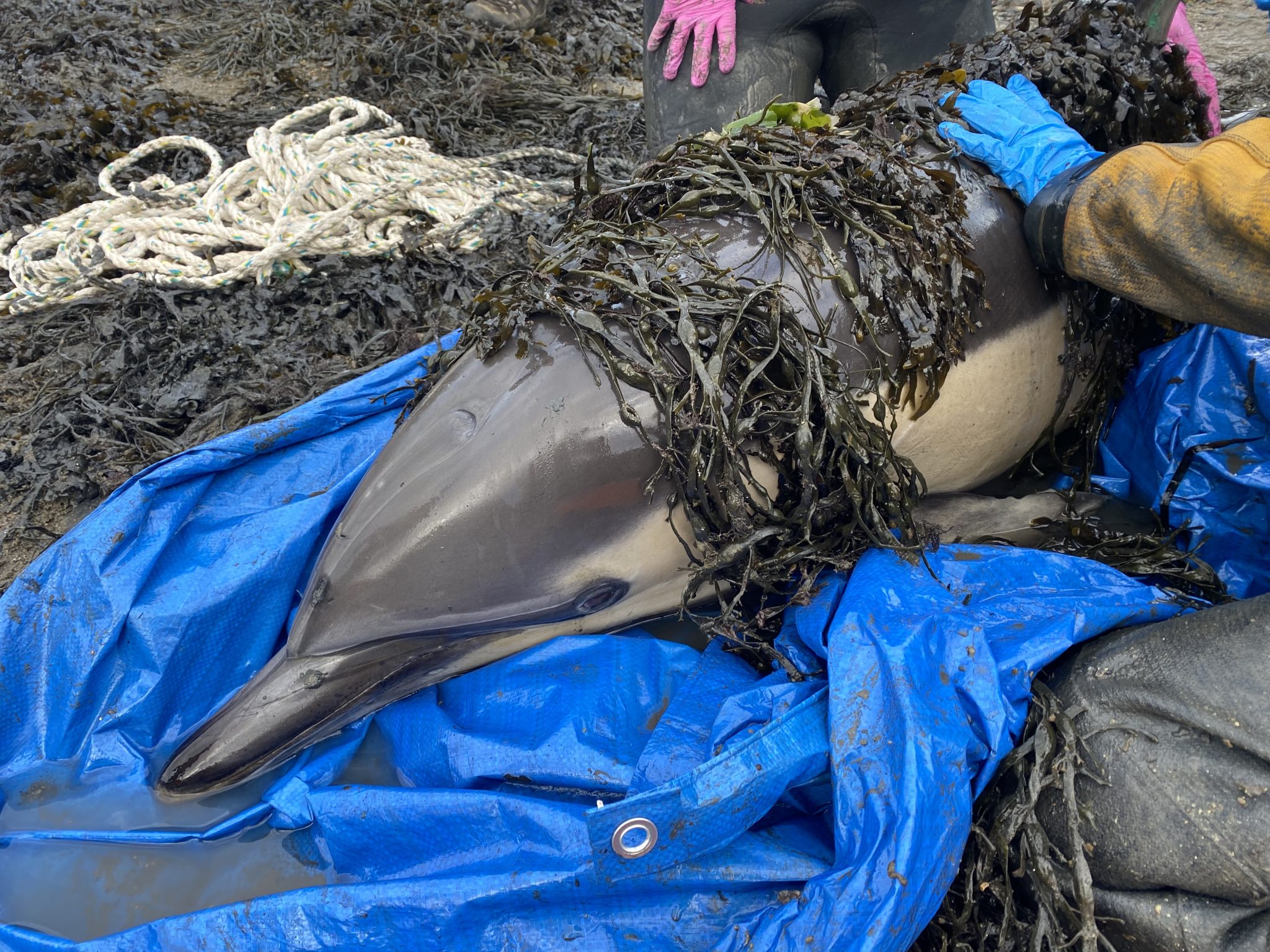
At around 11:40 on Friday 16 February, a lone common dolphin was reported to British Divers Marine Life Rescue circling in the shallows in an inlet at Place, near Portscatho, in Cornwall. A couple of volunteer Marine Mammal Medics were sent down initially to monitor the animal in hope it would be able to get away by itself, and further assess the situation.
After an hour and a half or so of observation, the risk of stranding increased significantly as the tide went out as the inlet is very shallow, muddy and almost completely dries out over low tide. Therefore, a larger response team was dispatched with more equipment in preparation for a stranding. Indeed, the animal did soon strand in the mud and fell onto its side, submerging the blowhole. Luckily the team were on hand to help get it upright again quickly, then bring it ashore for a health assessment and to begin providing first aid. No obvious injuries could be found and it measured 2.03m, later confirmed as female.
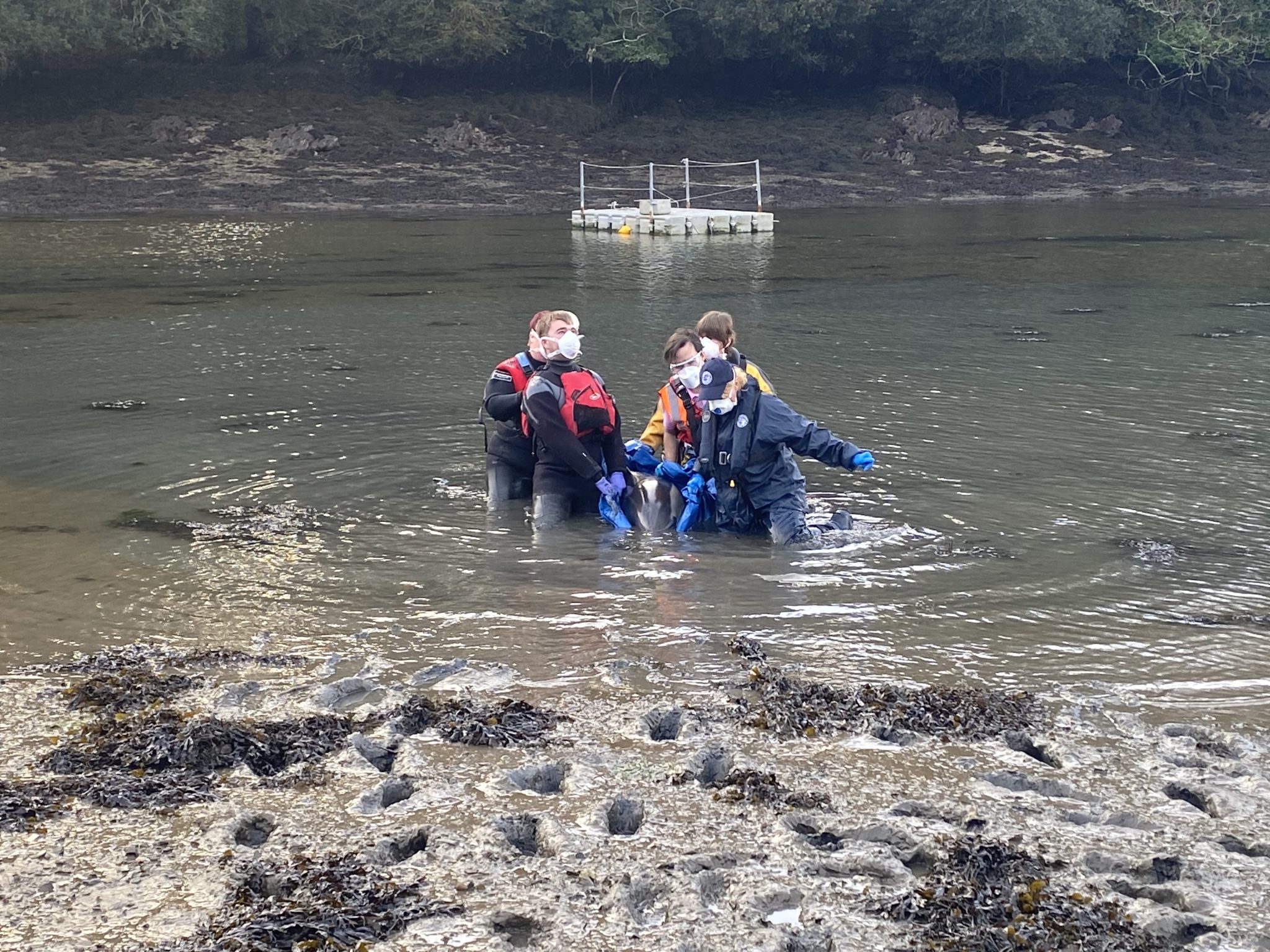
The team were soon joined by two vets, who were able to confirm the animal to be in moderate nutritional condition and appeared otherwise okay following a more detailed health check, and so was suitable for the team to attempt to refloat. However, it was not possible to refloat it safely in the inlet due to the nature of the geography, substrate and tide there it seemed the most likely reason this dolphin had stranded was due to getting disoriented in this location, and would struggle to get out again. Luckily a local resident had his boat tender moored nearby and was happy to use it a transport craft to take the dolphin out to deeper water.
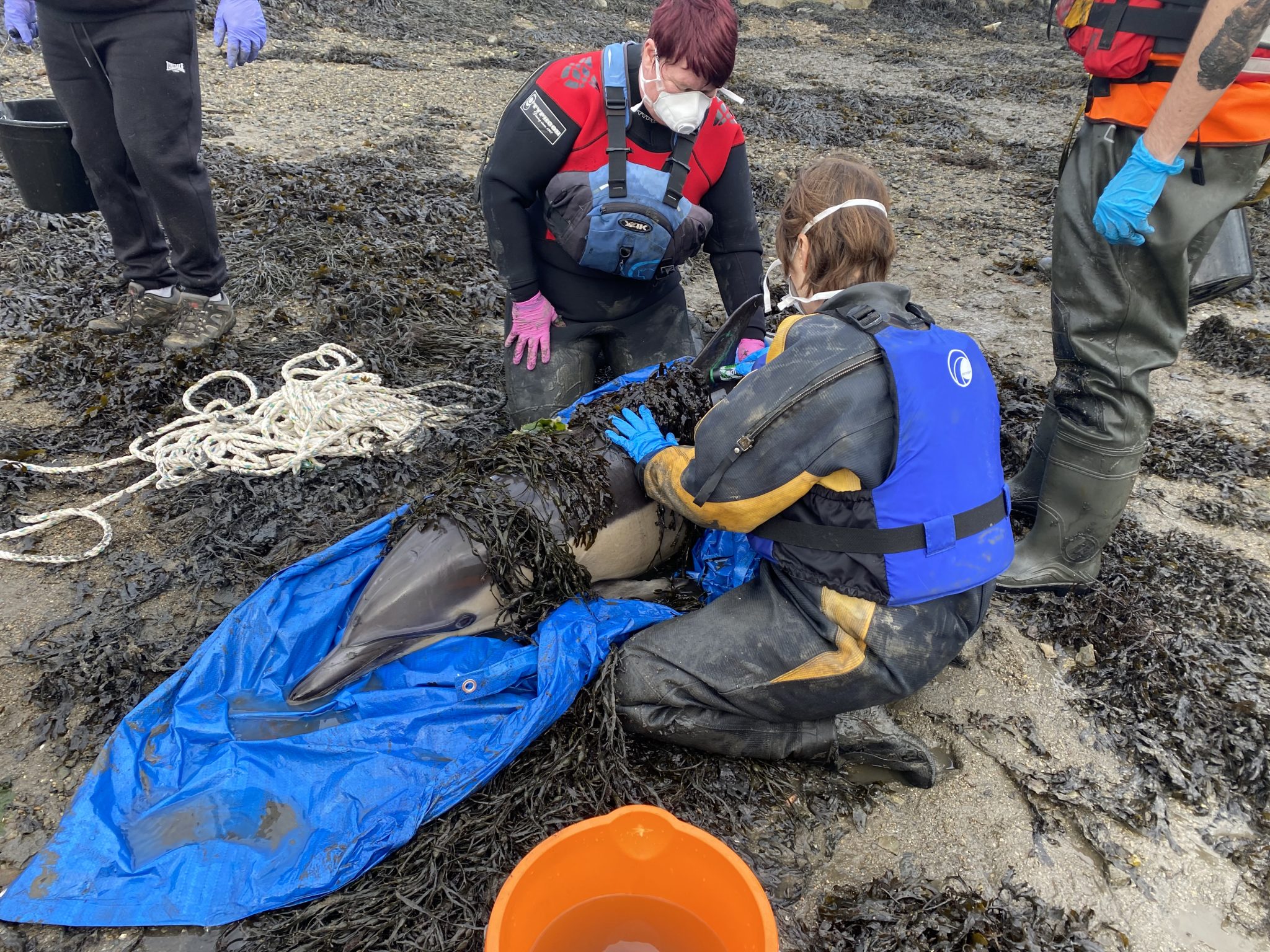
With help, the boat was slid across the mud and launched near the mouth of the inlet. A surfboard was placed on one side with a soft mat on top for the dolphin to lie comfortably on during the journey. When ready, the dolphin was carried across in a tarpaulin, transferred to a mesh stretcher and loaded on board with a team of four Medics including a vet.
The boat then carefully made its way out to the mouth of the Percuil River, facing into Carrick Roads and close to open sea, which was the most ideal site for release where the chance of returning and re-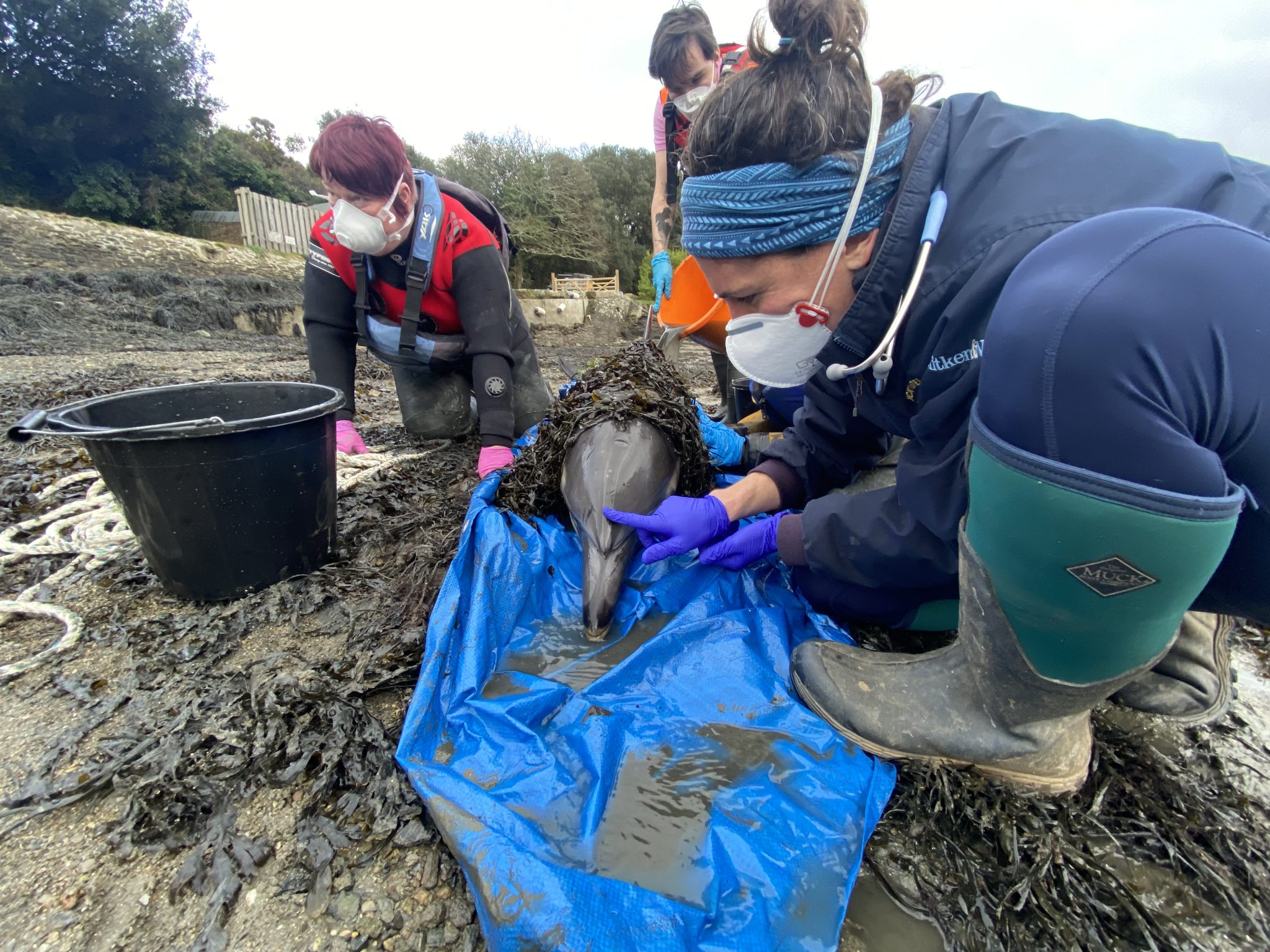 stranding was lower. The dolphin was carefully hauled overboard in the stretcher and held alongside briefly, though as she started kicking strongly almost straight away it was hard to keep hold and so she was released quickly. The boat retreated and the team observed her circling in the middle of the channel until she was lost from sight. The team returned to the inlet before darkness fell.
stranding was lower. The dolphin was carefully hauled overboard in the stretcher and held alongside briefly, though as she started kicking strongly almost straight away it was hard to keep hold and so she was released quickly. The boat retreated and the team observed her circling in the middle of the channel until she was lost from sight. The team returned to the inlet before darkness fell.
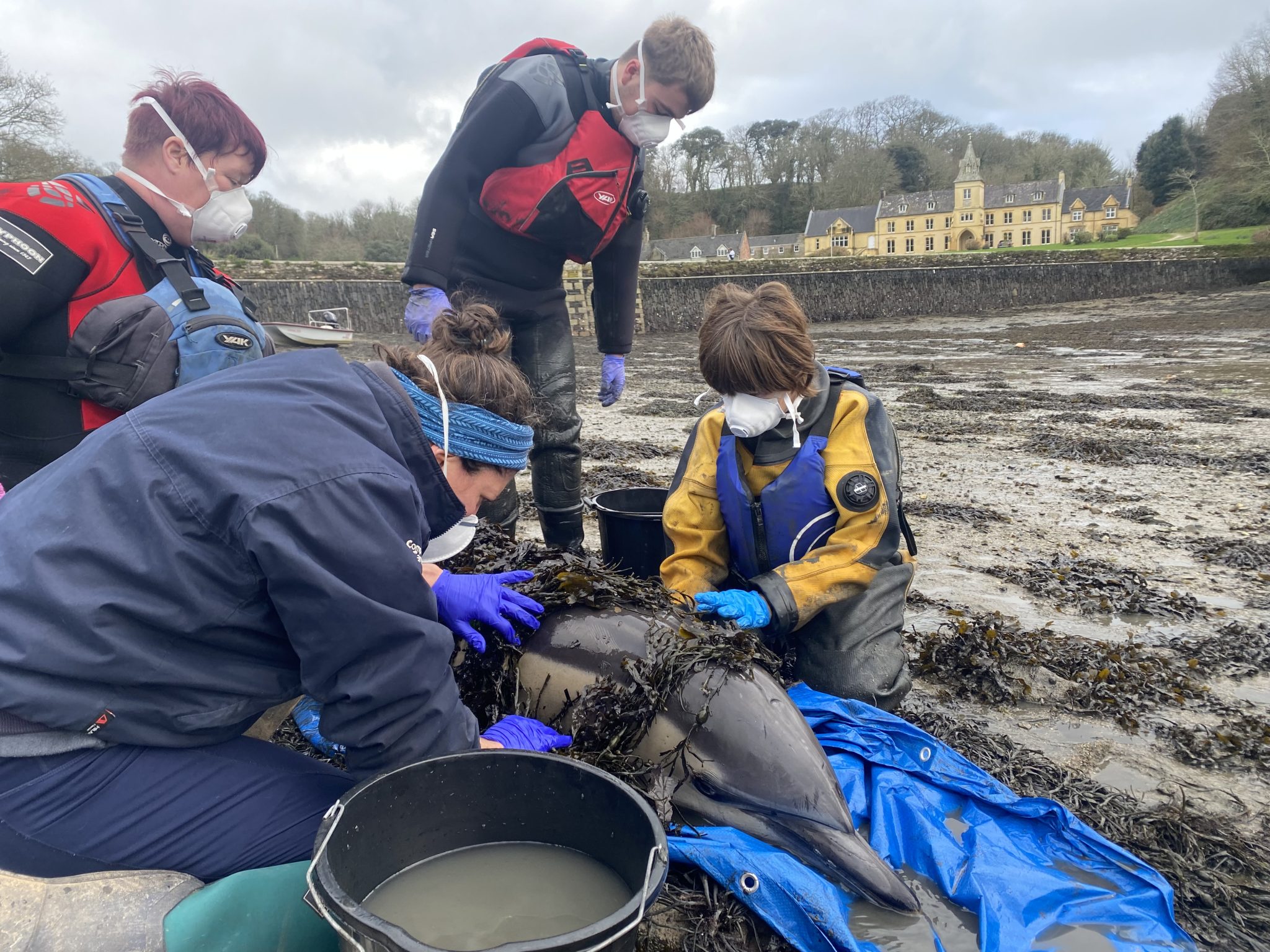
The area will be monitored over the weekend for re-sightings or re-strandings, but it is hoped that she will recover successfully and continue back out to sea. In the meantime BDMLR would like to thank the volunteer team, local residents and members of the public for all their efforts and support throughout this incident.
British Divers Marine Life Rescue is an international marine animal rescue organisation based in the UK and is a registered charity. The aims of the organisation are to provide a rescue service for marine wildlife, to support existing rehabilitation centres and to develop new methods of rescue, treatment, transport and care. Website www.bdmlr.org.uk.
Photos: Dan Jarvis
Blogs
Invitation from The Ocean Cleanup for San Francisco port call

6 years ago, The Ocean Cleanup set sail for the Great Pacific Garbage Patch with one goal: to develop the technology to be able to relegate the patch to the history books. On 6 September 2024, The Ocean Cleanup fleet returns to San Francisco bringing with it System 03 to announce the next phase of the cleanup of the Great Pacific Garbage Patch and to offer you a chance to view our cleanup system up-close and personal.
We look forward to seeing you there.
To confirm your presence, please RSVP to press@theoceancleanup.com
PROGRAM
Join The Ocean Cleanup as our two iconic ships and the extraction System 03 return to San Francisco, 6 years and over 100 extractions after we set sail, to create and validate the technology needed to rid the oceans of plastic.
Our founder and CEO, Boyan Slat, will announce the next steps for the cleanup of the Great Pacific Garbage Patch. Giving you a chance to view our cleanup system and the plastic extracted.
Hear important news on what’s next in the mission of The Ocean Cleanup as it seeks to make its mission of ridding the world’s oceans of plastic an achievable and realistic goal.
Interviews and vessel tours are available on request.
PRACTICALITIES
Date: September 6, 2024
Press conference: 12 pm (noon)
Location: The Exploratorium (Google Maps)
Pier 15 (Embarcadero at Green Street), San Francisco, CA
Parking: Visit The Exploratorium’s website for details.
RSVP: press@theoceancleanup.com
Video & photo material from several viewing spots around the bay
We look forward to seeing you there!
ABOUT THE OCEAN CLEANUP
The Ocean Cleanup is an international non-profit that develops and scales technologies to rid the world’s oceans of plastic. They aim to achieve this goal through a dual strategy: intercepting in rivers to stop the flow and cleaning up what has already accumulated in the ocean. For the latter, The Ocean Cleanup develops and deploys large-scale systems to efficiently concentrate the plastic for periodic removal. This plastic is tracked and traced to certify claims of origin when recycling it into new products. To curb the tide via rivers, The Ocean Cleanup has developed Interceptor™ Solutions to halt and extract riverine plastic before it reaches the ocean. As of June 2024, the non-profit has collected over 12 million kilograms (26.4 million pounds) of plastic from aquatic ecosystems around the world. Founded in 2013 by Boyan Slat, The Ocean Cleanup now employs a broadly multi-disciplined team of approximately 140. The foundation is headquartered in Rotterdam, the Netherlands, and opened its first regional office in Kuala Lumpur, Malaysia, in 2023.
Find out more about The Ocean Cleanup at www.theoceancleanup.com.
Marine Life & Conservation
SHARK MONTH ARRIVES AT ROYAL WILLIAM YARD, PLYMOUTH

A shark has been spotted approaching Royal William Yard in Plymouth, much to the surprise of swimmers, paddleboarders and onlookers.
With its distinctive dorsal fin cutting through the water, the sizeable shark swam along the coastline, before turning to head inland towards Firestone Arch at Royal William Yard. The appearance drew a crowd, who were captivated for more than an hour by the unusual sight – and it was all caught on video.
The shark is one of many expected sightings at Royal William Yard over the coming weeks… because today marks the start of Shark Month!
In reality, the ‘shark’ spotted along the Plymouth shoreline was actually a custom-made model, created by the team at Royal William Yard and sailed underwater by Caroline Robertson‑Brown from the Shark Trust, who donned scuba diving gear for the occasion.
The stunt took place to launch Shark Month in style and draw attention to the work of the leading international conservation charity, which is based in Britain’s Ocean City. Spectators were reassured that the water was safe and many entered into the spirit of the performance, swimming or sailing alongside the shark.
Shark Month will take place across Royal William Yard throughout July and will feature an extravaganza of art, entertainment and advocacy for everyone to enjoy. The packed programme of events starts with an art exhibition and ends with a trip on paddleboards with shark experts – with everything from a shark quiz to a Jaws screening in between.
Paul Cox, CEO of the Shark Trust, said: “There are often assumptions and misconceptions when it comes to sharks. This was certainly the case with the shark spotted at Royal William Yard! While the British coastline is home to many species of shark, this was not one of them. However, we’re thrilled it caught people’s attention, because seeing a shark is a special and memorable moment. That is precisely why we want to celebrate these incredible creatures, highlight the need for conservation, and ask for help to safeguard their future.”
For more information about Shark Month at Royal William Yard, visit the Shark Trust Website.
Images and video: Jay Stone
-

 Blogs2 months ago
Blogs2 months agoDiving With… Nico, Ocean Earth Travels, Indonesia
-

 News1 month ago
News1 month agoMurex Bangka Announce New Oceanfront Cottages & Beachfront Dining
-

 Blogs2 months ago
Blogs2 months agoA new idea in freediving from RAID
-

 Marine Life & Conservation1 month ago
Marine Life & Conservation1 month agoIceland issue millionaire whale hunter a licence to murder 128 vulnerable fin whales
-

 Marine Life & Conservation2 months ago
Marine Life & Conservation2 months agoThe Shark Trust Great Shark Snapshot is back
-

 News3 months ago
News3 months agoCharting New Waters; NovoScuba Goes Global with the Launch of their Revolutionary Dive Training Agency!
-

 Gear News1 month ago
Gear News1 month agoNew Suunto Ocean – a dive computer and GPS sports watch in one for adventures below and above the surface
-

 Marine Life & Conservation Blogs2 months ago
Marine Life & Conservation Blogs2 months agoBook Review: Plankton














